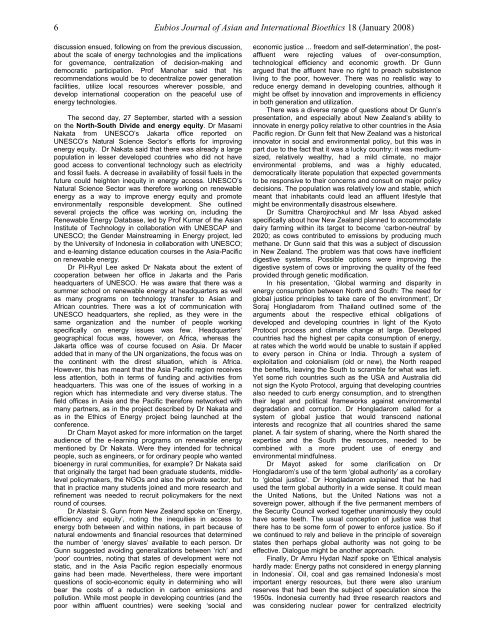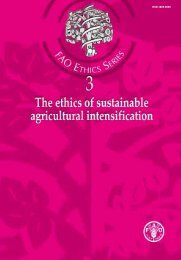Eubios Journal of Asian and International Bioethics EJAIB
Eubios Journal of Asian and International Bioethics EJAIB
Eubios Journal of Asian and International Bioethics EJAIB
- No tags were found...
Create successful ePaper yourself
Turn your PDF publications into a flip-book with our unique Google optimized e-Paper software.
6<strong>Eubios</strong> <strong>Journal</strong> <strong>of</strong> <strong>Asian</strong> <strong>and</strong> <strong>International</strong> <strong>Bioethics</strong> 18 (January 2008)discussion ensued, following on from the previous discussion,about the scale <strong>of</strong> energy technologies <strong>and</strong> the implicationsfor governance, centralization <strong>of</strong> decision-making <strong>and</strong>democratic participation. Pr<strong>of</strong> Manohar said that hisrecommendations would be to decentralize power generationfacilities, utilize local resources wherever possible, <strong>and</strong>develop international cooperation on the peaceful use <strong>of</strong>energy technologies.The second day, 27 September, started with a sessionon the North-South Divide <strong>and</strong> energy equity. Dr MasamiNakata from UNESCO’s Jakarta <strong>of</strong>fice reported onUNESCO’s Natural Science Sector’s efforts for improvingenergy equity. Dr Nakata said that there was already a largepopulation in lesser developed countries who did not havegood access to conventional technology such as electricity<strong>and</strong> fossil fuels. A decrease in availability <strong>of</strong> fossil fuels in thefuture could heighten inequity in energy access. UNESCO’sNatural Science Sector was therefore working on renewableenergy as a way to improve energy equity <strong>and</strong> promoteenvironmentally responsible development. She outlinedseveral projects the <strong>of</strong>fice was working on, including theRenewable Energy Database, led by Pr<strong>of</strong> Kumar <strong>of</strong> the <strong>Asian</strong>Institute <strong>of</strong> Technology in collaboration with UNESCAP <strong>and</strong>UNESCO; the Gender Mainstreaming in Energy project, ledby the University <strong>of</strong> Indonesia in collaboration with UNESCO;<strong>and</strong> e-learning distance education courses in the Asia-Pacificon renewable energy.Dr Pil-Ryul Lee asked Dr Nakata about the extent <strong>of</strong>cooperation between her <strong>of</strong>fice in Jakarta <strong>and</strong> the Parisheadquarters <strong>of</strong> UNESCO. He was aware that there was asummer school on renewable energy at headquarters as wellas many programs on technology transfer to <strong>Asian</strong> <strong>and</strong>African countries. There was a lot <strong>of</strong> communication withUNESCO headquarters, she replied, as they were in thesame organization <strong>and</strong> the number <strong>of</strong> people workingspecifically on energy issues was few. Headquarters’geographical focus was, however, on Africa, whereas theJakarta <strong>of</strong>fice was <strong>of</strong> course focused on Asia. Dr Maceradded that in many <strong>of</strong> the UN organizations, the focus was onthe continent with the direst situation, which is Africa.However, this has meant that the Asia Pacific region receivesless attention, both in terms <strong>of</strong> funding <strong>and</strong> activities fromheadquarters. This was one <strong>of</strong> the issues <strong>of</strong> working in aregion which has intermediate <strong>and</strong> very diverse status. Thefield <strong>of</strong>fices in Asia <strong>and</strong> the Pacific therefore networked withmany partners, as in the project described by Dr Nakata <strong>and</strong>as in the Ethics <strong>of</strong> Energy project being launched at theconference.Dr Charn Mayot asked for more information on the targetaudience <strong>of</strong> the e-learning programs on renewable energymentioned by Dr Nakata. Were they intended for technicalpeople, such as engineers, or for ordinary people who wantedbioenergy in rural communities, for example? Dr Nakata saidthat originally the target had been graduate students, middlelevelpolicymakers, the NGOs <strong>and</strong> also the private sector, butthat in practice many students joined <strong>and</strong> more research <strong>and</strong>refinement was needed to recruit policymakers for the nextround <strong>of</strong> courses.Dr Alastair S. Gunn from New Zeal<strong>and</strong> spoke on ‘Energy,efficiency <strong>and</strong> equity’, noting the inequities in access toenergy both between <strong>and</strong> within nations, in part because <strong>of</strong>natural endowments <strong>and</strong> financial resources that determinedthe number <strong>of</strong> ‘energy slaves’ available to each person. DrGunn suggested avoiding generalizations between ‘rich’ <strong>and</strong>‘poor’ countries, noting that states <strong>of</strong> development were notstatic, <strong>and</strong> in the Asia Pacific region especially enormousgains had been made. Nevertheless, there were importantquestions <strong>of</strong> socio-economic equity in determining who willbear the costs <strong>of</strong> a reduction in carbon emissions <strong>and</strong>pollution. While most people in developing countries (<strong>and</strong> thepoor within affluent countries) were seeking ‘social <strong>and</strong>economic justice ... freedom <strong>and</strong> self-determination’, the postaffluentwere rejecting values <strong>of</strong> over-consumption,technological efficiency <strong>and</strong> economic growth. Dr Gunnargued that the affluent have no right to preach subsistenceliving to the poor, however. There was no realistic way toreduce energy dem<strong>and</strong> in developing countries, although itmight be <strong>of</strong>fset by innovation <strong>and</strong> improvements in efficiencyin both generation <strong>and</strong> utilization.There was a diverse range <strong>of</strong> questions about Dr Gunn’spresentation, <strong>and</strong> especially about New Zeal<strong>and</strong>’s ability toinnovate in energy policy relative to other countries in the AsiaPacific region. Dr Gunn felt that New Zeal<strong>and</strong> was a historicalinnovator in social <strong>and</strong> environmental policy, but this was inpart due to the fact that it was a lucky country: it was mediumsized,relatively wealthy, had a mild climate, no majorenvironmental problems, <strong>and</strong> was a highly educated,democratically literate population that expected governmentsto be responsive to their concerns <strong>and</strong> consult on major policydecisions. The population was relatively low <strong>and</strong> stable, whichmeant that inhabitants could lead an affluent lifestyle thatmight be environmentally disastrous elsewhere.Dr Sumittra Charojrochkul <strong>and</strong> Mr Issa Abyad askedspecifically about how New Zeal<strong>and</strong> planned to accommodatedairy farming within its target to become ‘carbon-neutral’ by2020; as cows contributed to emissions by producing muchmethane. Dr Gunn said that this was a subject <strong>of</strong> discussionin New Zeal<strong>and</strong>. The problem was that cows have inefficientdigestive systems. Possible options were improving thedigestive system <strong>of</strong> cows or improving the quality <strong>of</strong> the feedprovided through genetic modification.In his presentation, ‘Global warming <strong>and</strong> disparity inenergy consumption between North <strong>and</strong> South: The need forglobal justice principles to take care <strong>of</strong> the environment’, DrSoraj Hongladarom from Thail<strong>and</strong> outlined some <strong>of</strong> thearguments about the respective ethical obligations <strong>of</strong>developed <strong>and</strong> developing countries in light <strong>of</strong> the KyotoProtocol process <strong>and</strong> climate change at large. Developedcountries had the highest per capita consumption <strong>of</strong> energy,at rates which the world would be unable to sustain if appliedto every person in China or India. Through a system <strong>of</strong>exploitation <strong>and</strong> colonialism (old or new), the North reapedthe benefits, leaving the South to scramble for what was left.Yet some rich countries such as the USA <strong>and</strong> Australia didnot sign the Kyoto Protocol, arguing that developing countriesalso needed to curb energy consumption, <strong>and</strong> to strengthentheir legal <strong>and</strong> political frameworks against environmentaldegradation <strong>and</strong> corruption. Dr Hongladarom called for asystem <strong>of</strong> global justice that would transcend nationalinterests <strong>and</strong> recognize that all countries shared the sameplanet. A fair system <strong>of</strong> sharing, where the North shared theexpertise <strong>and</strong> the South the resources, needed to becombined with a more prudent use <strong>of</strong> energy <strong>and</strong>environmental mindfulness.Dr Mayot asked for some clarification on DrHongladarom’s use <strong>of</strong> the term ‘global authority’ as a corollaryto ‘global justice’. Dr Hongladarom explained that he hadused the term global authority in a wide sense. It could meanthe United Nations, but the United Nations was not asovereign power, although if the five permanent members <strong>of</strong>the Security Council worked together unanimously they couldhave some teeth. The usual conception <strong>of</strong> justice was thatthere has to be some form <strong>of</strong> power to enforce justice. So ifwe continued to rely <strong>and</strong> believe in the principle <strong>of</strong> sovereignstates then perhaps global authority was not going to beeffective. Dialogue might be another approach.Finally, Dr Amru Hydari Nazif spoke on ‘Ethical analysishardly made: Energy paths not considered in energy planningin Indonesia’. Oil, coal <strong>and</strong> gas remained Indonesia’s mostimportant energy resources, but there were also uraniumreserves that had been the subject <strong>of</strong> speculation since the1950s. Indonesia currently had three research reactors <strong>and</strong>was considering nuclear power for centralized electricity
















